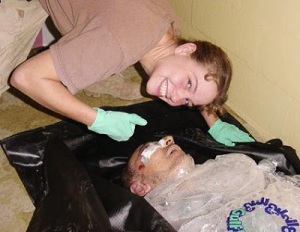Item: Report Says C.I.A. Used Media Leaks to Advantage (CIA utilizava vazamentos à mídia para ganhar vantagem)
Fonte: NYTimes.com (carinhosamente, «the gray lady»)
No meio de um curta nota, o Times confessa ter colaborado com a CIA (a ABIN deles) durante a Guerra Contra Terror
A Agência Central de Inteligênica vazou pautas a jornalistas na tentativa de remoldar a percepção seu programa de prisão e interogatório era uma ferramenta útil na guerra contra o terror, segundo um relatório da commissão de inteligência do Senado, lançado na segunda-feira (547 pp.)
O relatrório tambem informou de que, em 2002, uma certa publicação, mais tarde revelado como ser o próprio Times, tinha concordado em reter informações sobre uma prisão na Tailândia, seguindo as órdens da CIA e o vice-president Dick Cheney.
Além de demostrar pormenores mais vívidos do uso de prisões secretos e de técnicas de tortura mais agressivas antes desconhecidas — o relatório traz exemplos da relação entre a CIA e journalists após os atentados de Sept. 11, 2001.
Continuo traduzindo brevemente.
De vez em quando a CIA authorizou o vazamento de informação sigilosa aos jornalistas. No entanto, nos últimos anos, o governo investigou jornalistas e servidores, inclusive o processamento de uma agente da CIA por ter vazado informações detalhes das torturas.
Em 2005, um e-mail de advogados trabalhando no Centro Contra-Terrorism cobrou da C.I.A. a liderança to “enfrentar a inconsistência entre uma CIA to ‘confront the inconsistency’ between one C.I.A. prepared with arguments ‘about how critical it is to keep this information secret’ and the C.I.A. “planning to reveal darn near the entire program.’ “
The report notes specific instances in which there were divisions within the intelligence community over the agency’s decision to leak classified material on its interrogation of alleged members of Al Qaeda, particularly the detainee Abu Zubaydah.
Quando trabalhava com repórters e áncoras — tipo Tom Brokaw, que fez uma reportagem para (MS)NBC e o autor Ronald Kessler produced “The C.I.A. at War” — A CIA em pé de guerra — the agency never filed a “crimes report” over the leaking of classified material, the report notes.
Segundo 2005 the C.I.A. decided to cooperate with a Times reporter, Douglas Jehl, as he reported on the treatment of Abu Zubaydah. An agency official, who was not named in the report, concluded that Mr. Jehl’s article was “not necessarily an unflattering story.”
Mr. Jehl, who is now the foreign editor of The Washington Post, “provided the C.I.A. with a detailed outline of his proposed story, informed the C.I.A. that he would emphasize that the C.I.A.’s enhanced interrogation techniques worked,” the report said. The article was never published.
Segundo o relatório, em 2005 a CIA resolveu cooperar com repórter do Times, Douglas Jehl, que estava investigando o tratamento de Abu Zubaydah. Um agente, cujo nome não foi fornecido, opinou que o artigo “não ser necessariamente uma matéria constrangedora.”
Jehl, hoje editor de politica externa no Washington Post, “forneceu ao C.I.A. um esboço intensivo do seu trabalha, informando que ele ia enfatizar que as novas técnicas funcionavam bem. A matéria jamais foi divulgado.
Num e-mail, Jehl se disse que “trabalhava agressivamente para perseguir and divulgar matérias sobre os tratamentos duros, num momento quando matérias sobre tortura pipocavam, embora esses fatos foram baseado em conversas reservadas com autoridades correntes e aposentados.
[ … ]
Senhor Kessler, entretanto, defendia seu livro e disse que ele tinha corroborado com o FBI.
“Esse relátorio não tem influência ,” dissse, acrescentando que foi que foi editado pelos Democratas que desistiu de conduzir entrevistas com muitos dos «players». Pode um State reclutar outros para manter prisões secretos?
Repórter do Times, James Risen disse on teirca-feira que o journal anônimo foi, de fato, The Times, e que a atividade era realizada ne Thailândis. O jornal publicou as detalhes mais tarde, em December 2003, mas en essas alturas Abu Zubaydah já tinha sido .
Arthur Sulzberger Jr., the publisher of The Times, defended the paper’s decision to delay publication of the information.
The Senate report also highlighted an incident in which the
In an email, Mr. Jehl said he had “worked aggressively to pursue and publish stories about the C.I.A.’s harsh interrogation of terrorist suspects, at a time when those details remained highly classified.” He is proud of that work, he said, but was not interviewed by the Senate panel “and would never comment on reporting that was based on confidential conversations with current and former U.S. government officials.”
For his part, Mr. Kessler defended his book and said that he had corroborated what he was told with the F.B.I.
“This report is discredited,” he said, adding that it was written only by Democratic lawmakers and did not include interviews with many of the main players.
The Senate report also highlighted an incident in which the C.I.A. pressured an American newspaper to withhold naming the country that Abu Zubaydah was being held in. The agency was concerned that the report would damage the United States’ ability to recruit other countries to host secret prisons.
A Times reporter, James Risen, said Tuesday that the newspaper was The Times, and the country was Thailand. The paper disclosed the details later, in December 2003, but by that time Abu Zubaydah had been moved.
Arthur Sulzberger Jr., the publisher of The Times, defended the paper’s decision to delay publication of the information.
“There have been a handful of occasions when The Times has decided to hold back on publishing a given story after a compelling case had been made that immediate publication could potentially lead to a risk of life or other serious consequence,” he said. “The intention is always to publish as soon as we feel we responsibly can, as we did in this case.”
Filed under: Brazil |



